Choosing your first trading platform can feel overwhelming, with countless options promising low fees and powerful tools. For a beginner, the most important features aren't just about cost; they're about education, ease of use, and building good habits. This guide cuts through the noise to provide a detailed, honest look at the best trading platforms for beginners in 2025. We're here to help you move beyond marketing claims and find a platform that genuinely supports your learning curve.
Our goal is to equip you with the knowledge to select a platform that not only fits your budget but also supports your growth as an investor. We'll explore each platform's unique strengths, from paper trading accounts that let you practice risk-free to fractional shares that allow you to invest with just a few dollars. This resource is designed to solve a common problem for new investors: information overload and analysis paralysis. We provide clear, practical insights so you can make a confident decision.
In this comprehensive breakdown, you will find:
- Detailed reviews of top platforms like Fidelity, Charles Schwab, Robinhood, and more.
- An honest assessment of pros and cons from a beginner's perspective.
- Practical analysis of key features like educational resources, mobile app usability, and customer support.
- Screenshots and direct links for each platform to simplify your research process.
By the end of this article, you will have a clear understanding of which platform is the right starting point for your investment journey, helping you navigate the markets with confidence from day one. Let's find the right fit for your financial goals.
1. Fidelity Investments
Fidelity stands out as one of the best trading platforms for beginners by combining a full-service brokerage experience with an unwavering commitment to investor education. Its platform is designed to grow with you, starting with a user-friendly interface and zero-commission trades on U.S. stocks and ETFs, which removes a significant cost barrier for new investors. The absence of account minimums means you can start with any amount, making it highly accessible.
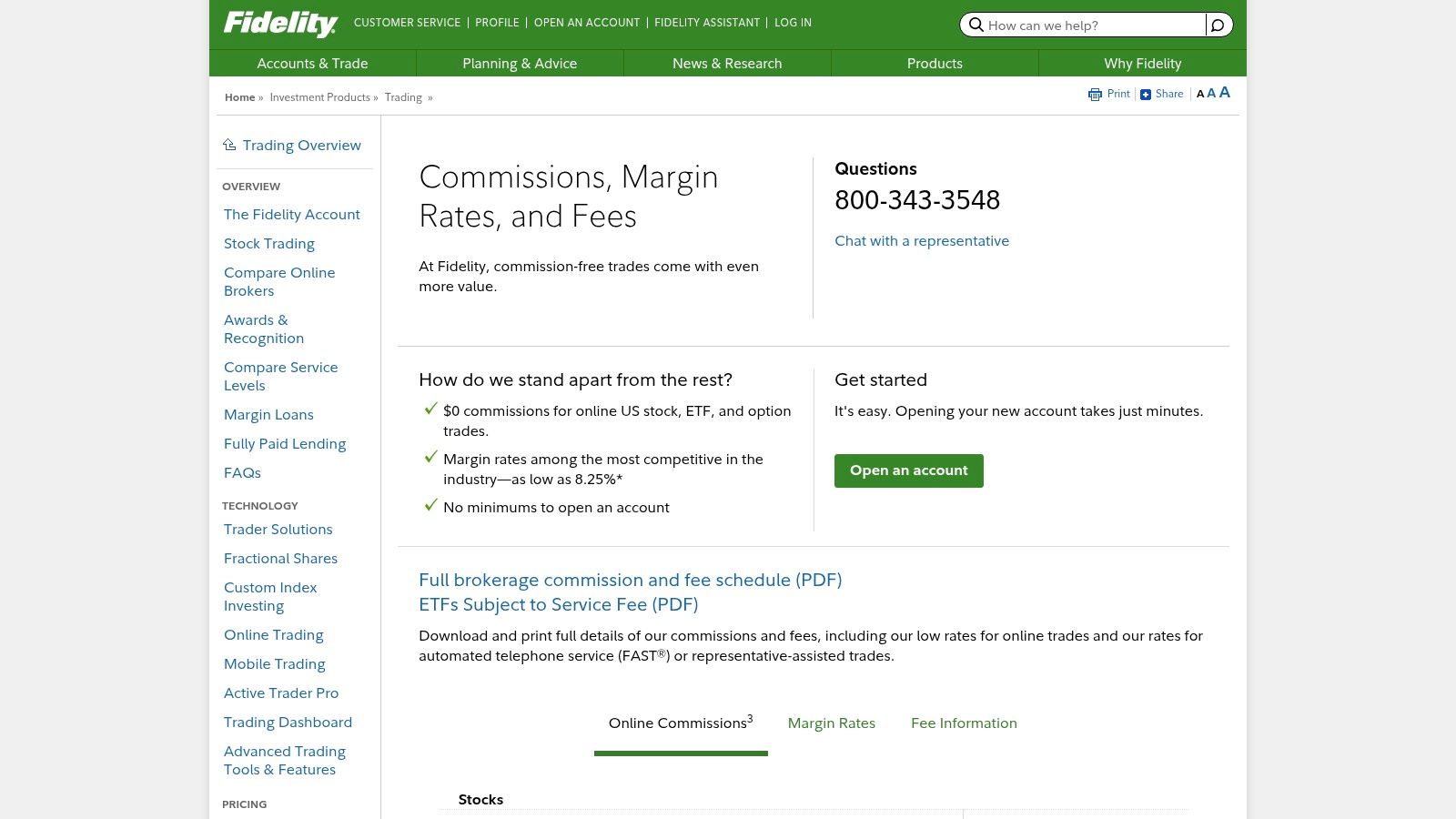
What truly distinguishes Fidelity is its comprehensive "Learning Center." This resource hub is packed with articles, webinars, and detailed guides that demystify complex financial topics, from basic stock selection to advanced options strategies. This educational support is integrated directly into the platform, providing context where you need it most.
Key Features & User Experience
Fidelity’s mobile app and desktop platform (Active Trader Pro) are both robust and intuitively designed. Beginners will find the mobile app easy to navigate for placing trades and monitoring their portfolio. A standout feature is "Stocks by the Slice," which allows you to buy fractional shares of thousands of U.S. stocks and ETFs for as little as $1. This is perfect for building a diversified portfolio without a large initial investment.
- Pricing: $0 commission for online U.S. stock, ETF, and options trades. Options contracts have a standard $0.65 fee.
- Best For: Long-term investors and beginners seeking strong educational resources and a comprehensive product lineup.
- Pros: Extensive free research tools, top-tier customer support, and no account fees or minimums.
- Cons: The sheer volume of tools and information can feel overwhelming at first.
Visit the website: https://www.fidelity.com/commissions
2. Charles Schwab
Charles Schwab excels as a top-tier trading platform for beginners by offering a powerful, scalable experience backed by exceptional customer support. It combines zero-commission online stock and ETF trades with access to the industry-renowned thinkorswim platform, creating an environment where new investors can start simple and grow into sophisticated trading. With no account minimums, Schwab ensures that anyone can begin their investment journey without a significant financial barrier.
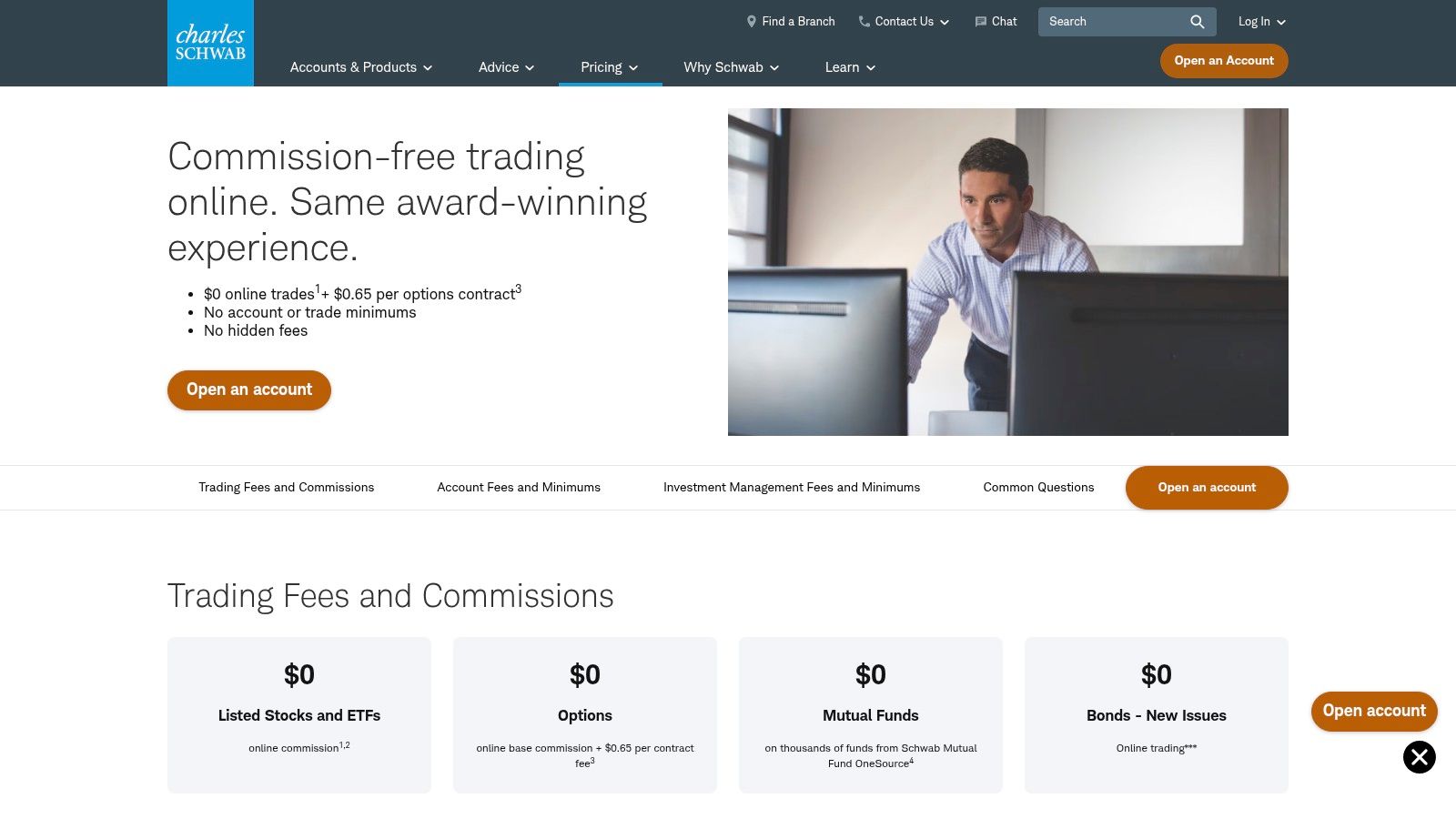
What sets Schwab apart is the integration of the thinkorswim platform, a tool beloved by advanced traders, yet made accessible to newcomers through its comprehensive paper trading feature. This allows beginners to practice trading strategies with virtual money, building confidence before risking real capital. This dual-platform approach, combined with extensive educational resources and 24/7 support, provides a complete ecosystem for investor development.
Key Features & User Experience
Schwab provides a clean, easy-to-use mobile app and web platform for core investing activities like monitoring a portfolio and placing trades. For those ready to learn more, the thinkorswim platform offers advanced charting, analytics, and a customizable interface. While its complexity can be steep, the paper trading mode is an invaluable educational tool. Schwab’s large network of physical branches also offers the option for in-person guidance, a rare feature among online brokers.
- Pricing: $0 commission for online U.S. stock and ETF trades. Options contracts are $0.65 per contract. OTC trades incur a $6.95 commission.
- Best For: Beginners who want a platform that can grow with them, from basic investing to advanced trading.
- Pros: Access to the powerful thinkorswim platform, outstanding customer support, and extensive educational content.
- Cons: The thinkorswim interface can be intimidating for complete novices at first.
Visit the website: https://www.schwab.com/pricing
3. E*TRADE from Morgan Stanley
E*TRADE secures its spot as one of the best trading platforms for beginners by offering a powerful yet user-friendly experience with clear pathways for growth. It provides a well-balanced ecosystem that caters to new investors with $0 commissions on U.S. stock and ETF trades, while also offering advanced tools and products like futures trading for when they gain more confidence. The platform’s clean design makes it less intimidating than more complex brokerages.
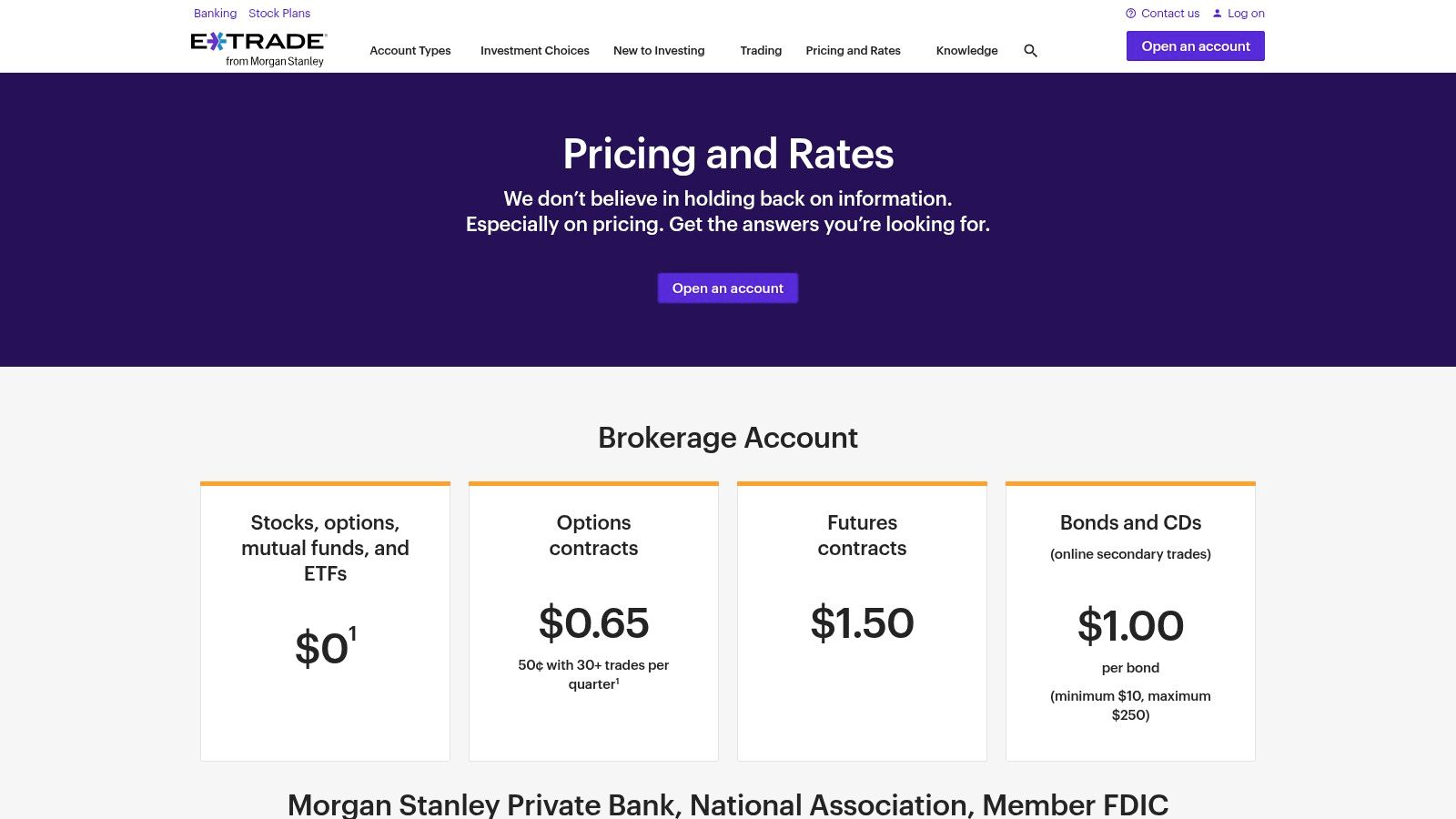
A unique aspect of E*TRADE is its "Core Portfolios" robo-advisor service, which is a great starting point for those who want a professionally managed portfolio. With a low minimum of $500, it automates the investment process, helping beginners build a diversified foundation while they learn the ropes of active trading. This blend of self-directed and automated investing options within one platform is a significant advantage.
Key Features & User Experience
E*TRADE's mobile app and web platform are known for their intuitive navigation and reliability, making it easy to place trades, manage your portfolio, and access research. The platform offers a vast library of educational content, including articles and videos, to support your learning journey. For those interested in passive investing, the extensive fund screener is a powerful tool for finding mutual funds and ETFs that match specific criteria.
- Pricing: $0 for online U.S. stock, ETF, and options trades. Options contracts are $0.65 each, with discounts for active traders.
- Best For: Beginners who want a robust platform that they can grow into without feeling overwhelmed at the start.
- Pros: Strong mobile app, broad range of investment products including futures, and frequent promotional offers for new accounts.
- Cons: Over-the-counter (OTC) stock trades have a $6.95 commission, and learning to trade futures can be complex for newcomers.
Visit the website: https://us.etrade.com/what-we-offer/pricing-and-rates
4. Robinhood
Robinhood pioneered the commission-free trading model and remains a top contender among the best trading platforms for beginners due to its exceptionally simple, mobile-first design. Its core mission is to democratize finance by making investing accessible, and it achieves this with a streamlined interface that removes much of the complexity found on traditional brokerage sites. For newcomers, the process of signing up and placing a first trade is remarkably fast and intuitive.
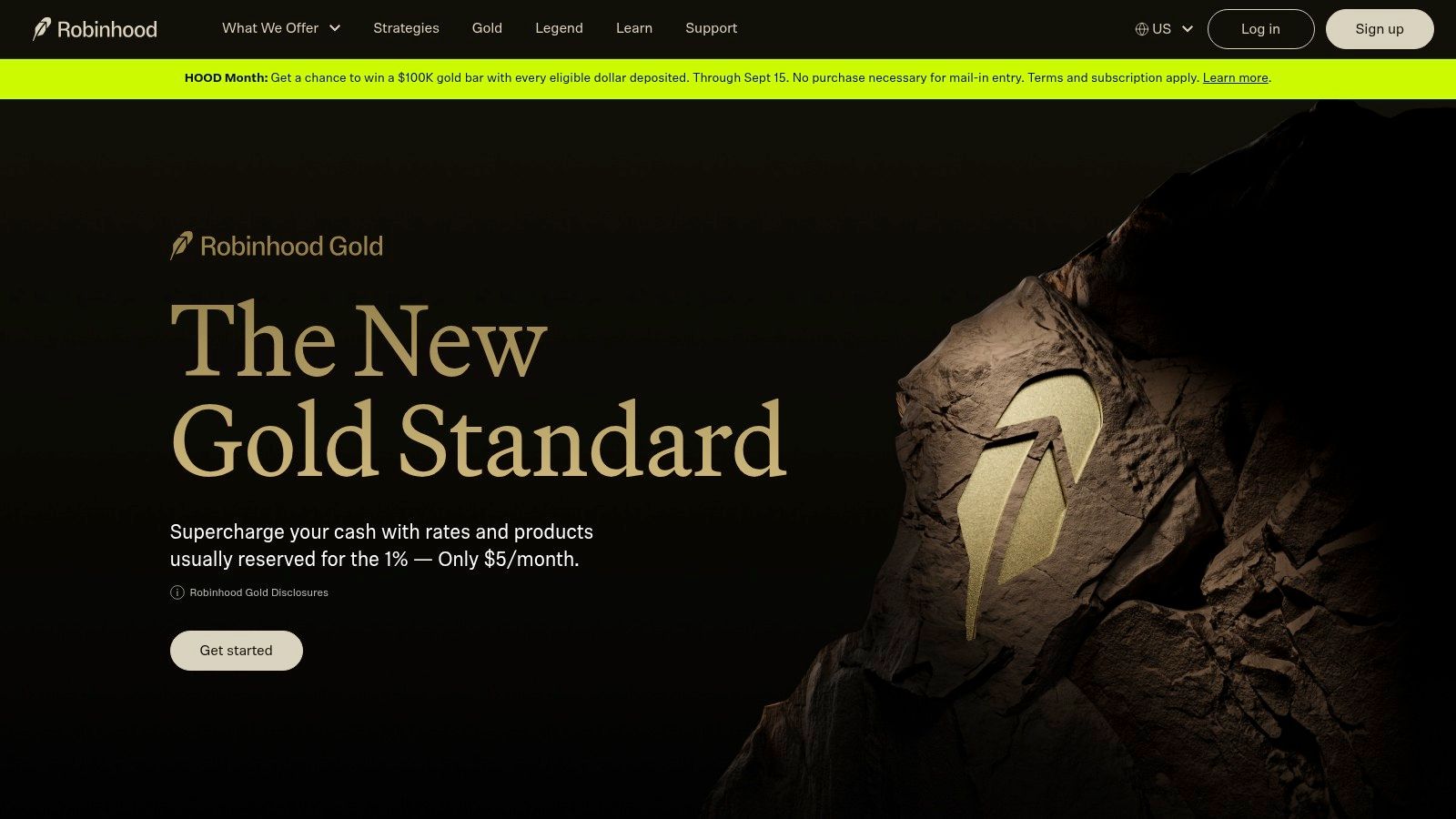
The platform is built around core trading of stocks, ETFs, options, and cryptocurrencies, all with a zero-commission structure. While its initial simplicity was sometimes seen as a limitation, Robinhood has continuously added features, including retirement accounts (IRAs) and fractional shares, making it a more well-rounded platform that can grow with an investor.
Key Features & User Experience
The user experience is Robinhood's defining feature; it’s clean, uncluttered, and focuses on the essential actions of searching for assets, viewing charts, and executing trades. Fractional shares, which allow you to invest with as little as $1, are a key benefit for beginners building a portfolio on a budget. The optional Robinhood Gold subscription ($5/month) unlocks more advanced features, such as professional research from Morningstar, Level II market data, and a higher interest rate on uninvested cash.
- Pricing: $0 commission for stocks, ETFs, and options. A premium Gold membership is available for $5/month for additional features.
- Best For: Mobile-first investors and absolute beginners who prioritize a simple, no-frills trading experience.
- Pros: Extremely easy-to-use interface, fractional share investing, and an expanding feature set including IRAs.
- Cons: Advanced research tools and data are locked behind the Gold subscription; limited mutual fund options.
Visit the website: https://robinhood.com/us/en/gold/
5. Webull
Webull has carved out a niche as one of the best trading platforms for beginners who are eager to develop their technical skills. It offers a powerful, tech-forward platform with zero-commission trading on U.S. stocks, ETFs, and options, making it an attractive low-cost entry point. The platform is especially well-suited for those who want to practice and learn before committing real capital, thanks to its robust paper trading feature.
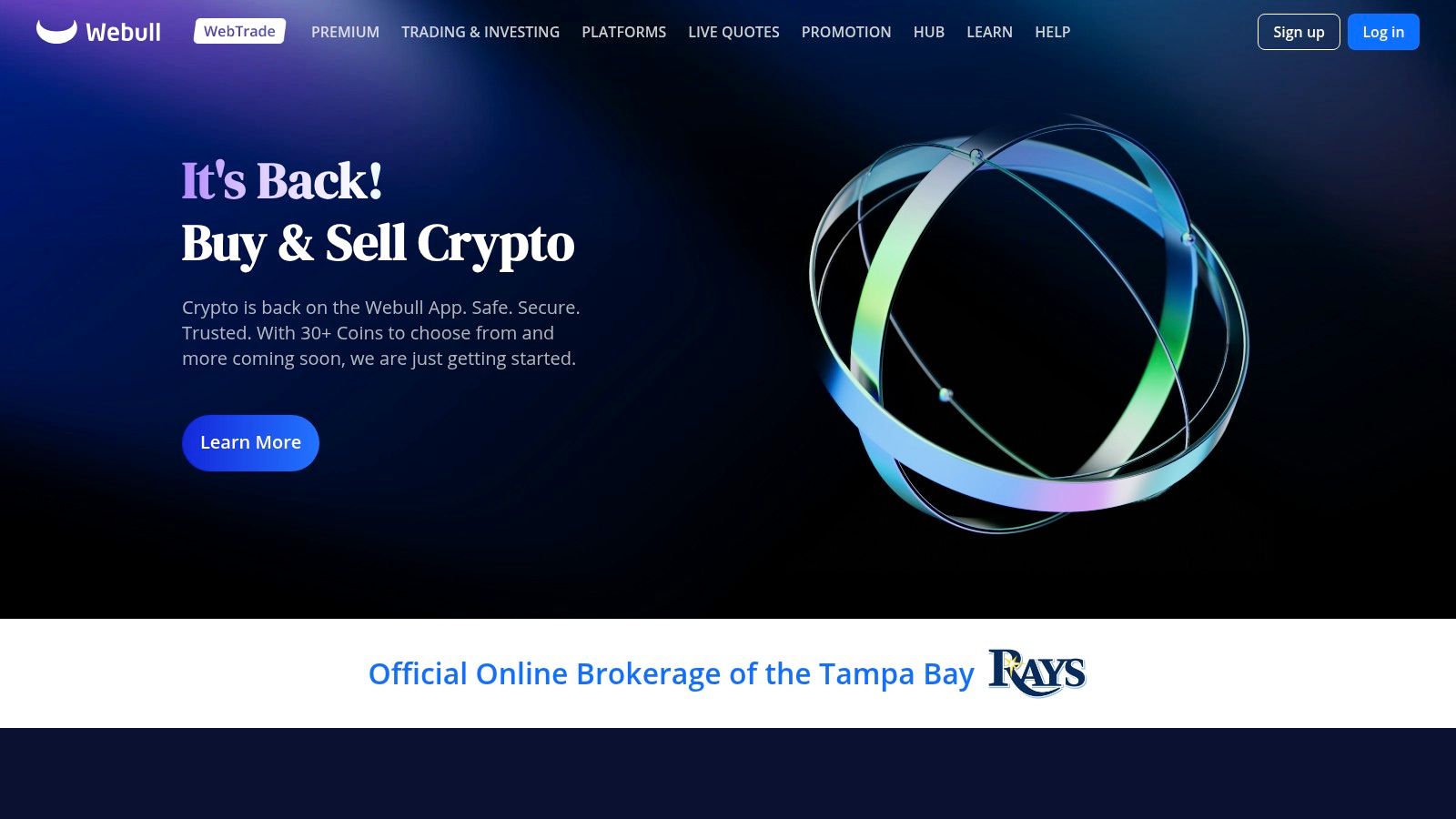
What truly sets Webull apart for aspiring traders is its emphasis on advanced charting and analysis tools, which are integrated directly into its mobile and desktop applications. While many beginner platforms simplify their interfaces, Webull provides a more professional-grade experience from the start. This allows new investors to become familiar with the tools used for in-depth market analysis, helping them transition from basic investing to more active trading strategies. For those looking to get started, you can explore this technical analysis for beginners guide to make the most of Webull's tools.
Key Features & User Experience
Webull's platform is designed for the modern, mobile-first trader, offering a sleek and data-rich user interface. The built-in paper trading simulator is a key feature, allowing users to practice trading with virtual money in a realistic market environment. This risk-free practice is invaluable for building confidence and testing strategies. Additionally, the platform supports fractional shares, allowing you to invest in high-priced stocks with a small amount of capital.
- Pricing: $0 commission for online U.S. stock, ETF, and options trades. Options have a $0 contract fee.
- Best For: Beginners and intermediate traders who want to access advanced charting tools and practice with a paper trading account.
- Pros: Excellent paper trading tools for practice, robust and free charting capabilities, and no account minimums.
- Cons: The paper trading simulator has some limitations compared to live trading, and the platform's educational resources are less extensive than some competitors.
Visit the website: https://www.webull.com/
6. Public.com
Public.com has carved out a niche as one of the best trading platforms for beginners by prioritizing transparency and a community-driven approach to investing. It offers commission-free trading on U.S. stocks and ETFs without relying on Payment for Order Flow (PFOF) for those trades, a practice that can create conflicts of interest. This commitment to transparent execution, combined with fractional shares, makes it an accessible and ethical choice for new investors.
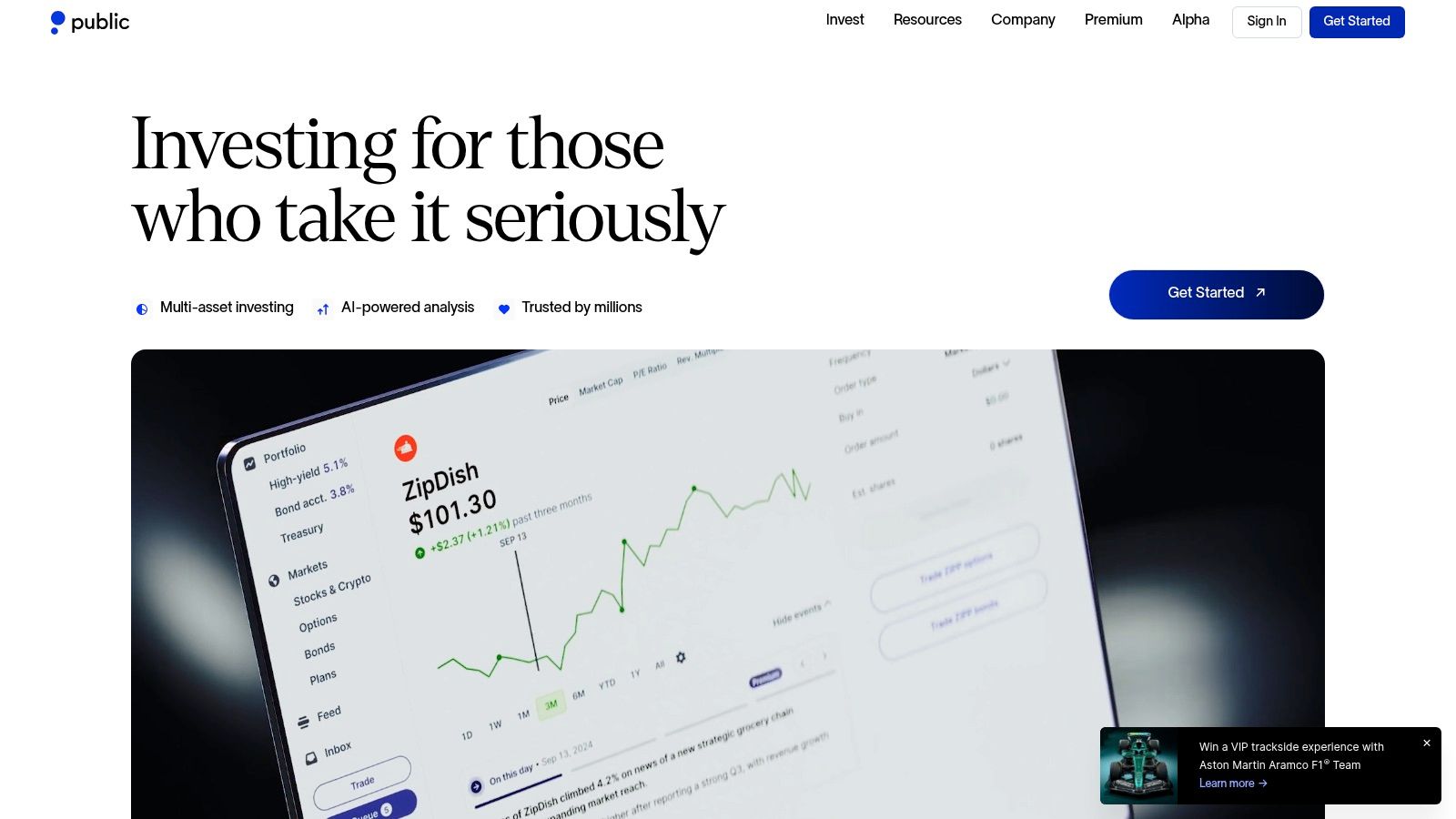
The platform integrates social features that allow users to follow other investors, share insights, and learn collaboratively. This social layer helps demystify the market by showing what real people are trading and why, providing a practical, community-based education that complements its formal content. It feels less like a traditional brokerage and more like a modern investment network.
Key Features & User Experience
Public.com’s mobile-first design is sleek and intuitive, making it incredibly easy for beginners to navigate, research investments, and place trades. Investment Plans allow users to automate their investing strategy in a curated theme or custom portfolio, promoting consistent, long-term habits. The platform also offers unique options trading rebates, where it shares a portion of its revenue back with the trader, reducing the net cost of contracts. The Premium tier unlocks valuable tools like extended-hours trading and advanced data for those ready to take the next step.
- Pricing: $0 commission for U.S. stock, ETF, and options trades. A Premium subscription ($10/month) is available for advanced features.
- Best For: New investors who value transparency, a community learning environment, and a simple mobile experience.
- Pros: No PFOF on stock/ETF trades, unique options rebate program, and strong community features for social learning.
- Cons: Some services like automated investment plans have fees without a Premium subscription, and crypto trading incurs separate fees.
Visit the website: https://public.com/
7. M1 Finance
M1 Finance carves out a unique niche among the best trading platforms for beginners by blending automated investing with customizable portfolio control. It is ideal for those who prefer a "set it and forget it" approach rather than active trading. The platform’s core concept revolves around creating "pies," which are visual representations of your portfolio where each slice is a stock or ETF you choose. This system makes diversification and long-term strategy intuitive and accessible from day one.
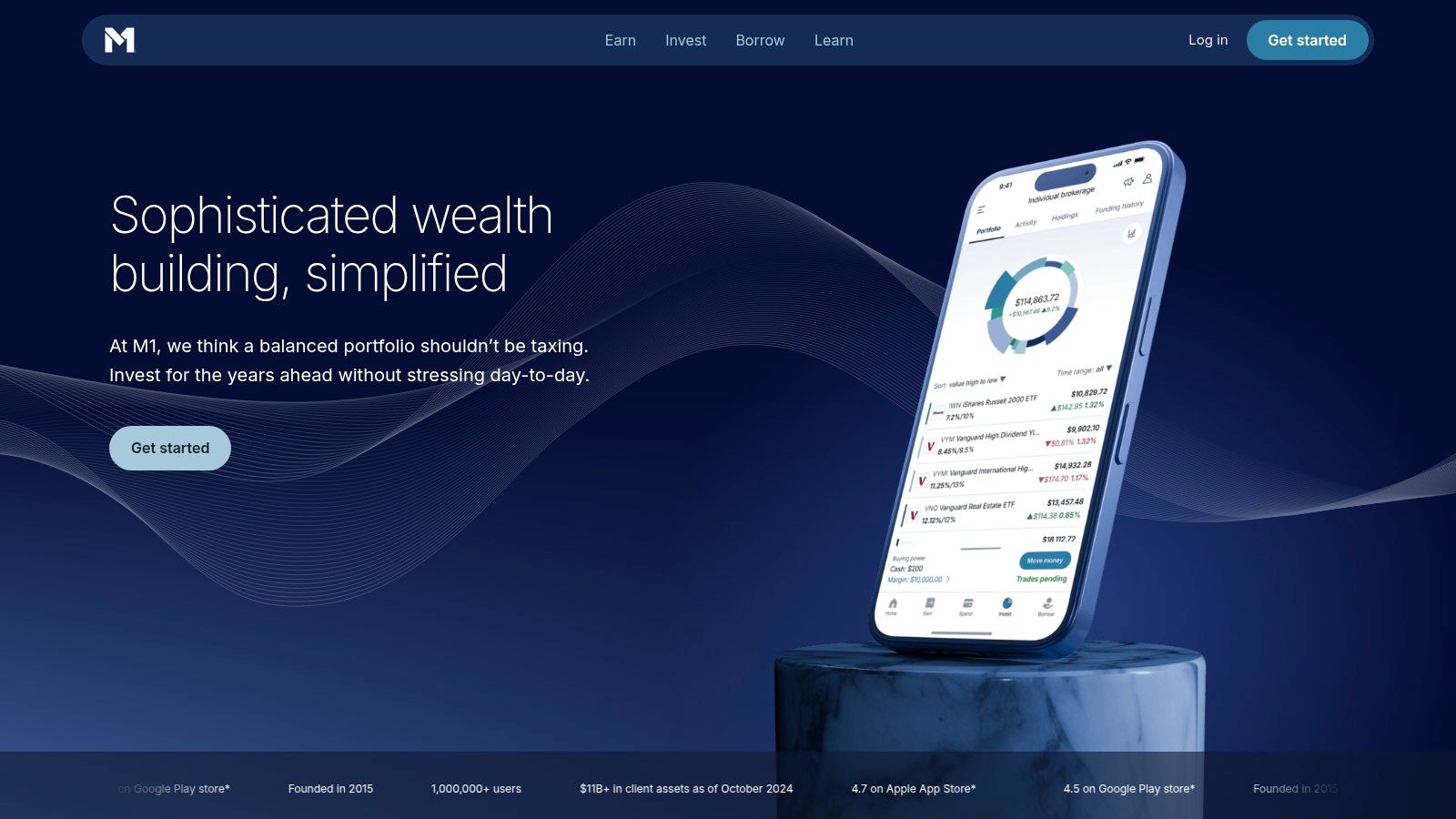
The platform is designed to automate good investing habits. Once you fund your account, M1 automatically invests your money into your custom pie, buying fractional shares to maintain your target allocations. This structure is perfectly suited for strategies like dollar-cost averaging, as you can set up recurring deposits and let the platform handle the rest. This automation simplifies building wealth over time without needing to manually place trades.
Key Features & User Experience
M1 Finance offers a sleek, modern interface on both its mobile app and website, focusing on portfolio visualization rather than complex trading charts. The "pie" concept is central to the experience, allowing you to easily build a portfolio from pre-made expert pies or create your own from thousands of available stocks and ETFs. Its auto-invest feature automatically rebalances your portfolio by directing new funds to underweight slices, keeping your strategy on track.
- Pricing: Commission-free trades. A platform fee of $3/month applies, but it's waived for accounts with at least $10,000 in assets or an active M1 Personal Loan.
- Best For: Beginners focused on long-term, passive, and automated investing.
- Pros: Highly beginner-friendly for passive investing, powerful automation and rebalancing features, and fractional shares enable building a diversified portfolio with small amounts.
- Cons: Not designed for active traders; lacks advanced tools and options trading. Platform fees can be a drawback for smaller accounts.
Visit the website: https://www.m1.com/
8. SoFi Invest
SoFi Invest positions itself as a strong contender for the best trading platforms for beginners by integrating investing directly into a broader personal finance ecosystem. It offers an approachable entry point with zero-commission trades on stocks and ETFs, plus the ability to purchase fractional shares, known as "Stock Bits." This all-in-one approach appeals to users who want to manage their banking, loans, and investments within a single, streamlined application.
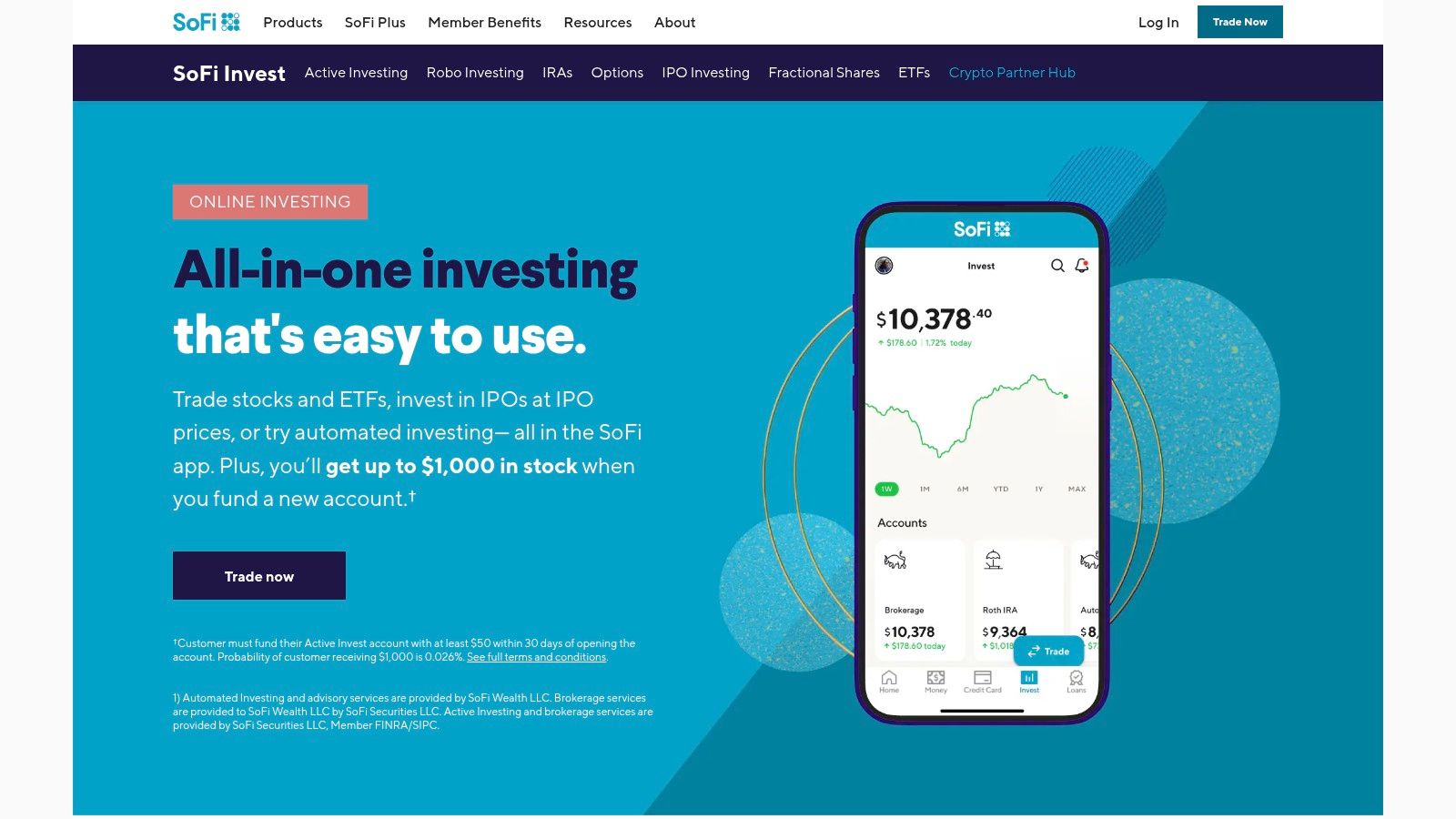
What makes SoFi Invest unique is its hybrid model, offering both active, self-directed investing and an automated robo-advisor service. New investors can start by picking their own stocks and later transition to the managed portfolio service if they prefer a hands-off approach. The platform also provides access to certified financial planners at no extra cost, a valuable resource for beginners needing guidance.
Key Features & User Experience
SoFi Invest’s mobile and web platforms are known for their clean, modern, and intuitive design, simplifying the process of trading and account management. The platform is built for ease of use rather than complex analysis, which is ideal for a new investor. A unique benefit is access to IPOs, allowing everyday investors to buy shares of companies at their initial public offering price, an opportunity typically reserved for institutional clients.
- Pricing: $0 commission for online stock and ETF trades. The automated investing service has a 0.25% annual advisory fee. A $25 inactivity fee applies after 6 months of no account logins.
- Best For: Beginners looking for an integrated financial app that combines banking, investing, and financial planning.
- Pros: Clean and user-friendly interface, access to financial planners, and fractional shares available.
- Cons: Limited advanced trading tools and order types; charges an inactivity fee.
Visit the website: https://www.sofi.com/invest/
9. Interactive Brokers (IBKR)
Interactive Brokers (IBKR) is often seen as a platform for professionals, but its IBKR Lite plan makes it one of the best trading platforms for beginners who aspire to become more sophisticated traders. This plan offers commission-free trades on U.S. stocks and ETFs, removing a key cost barrier. Its standout feature is unparalleled access to global markets, allowing even new investors to build a truly international portfolio from a single account.
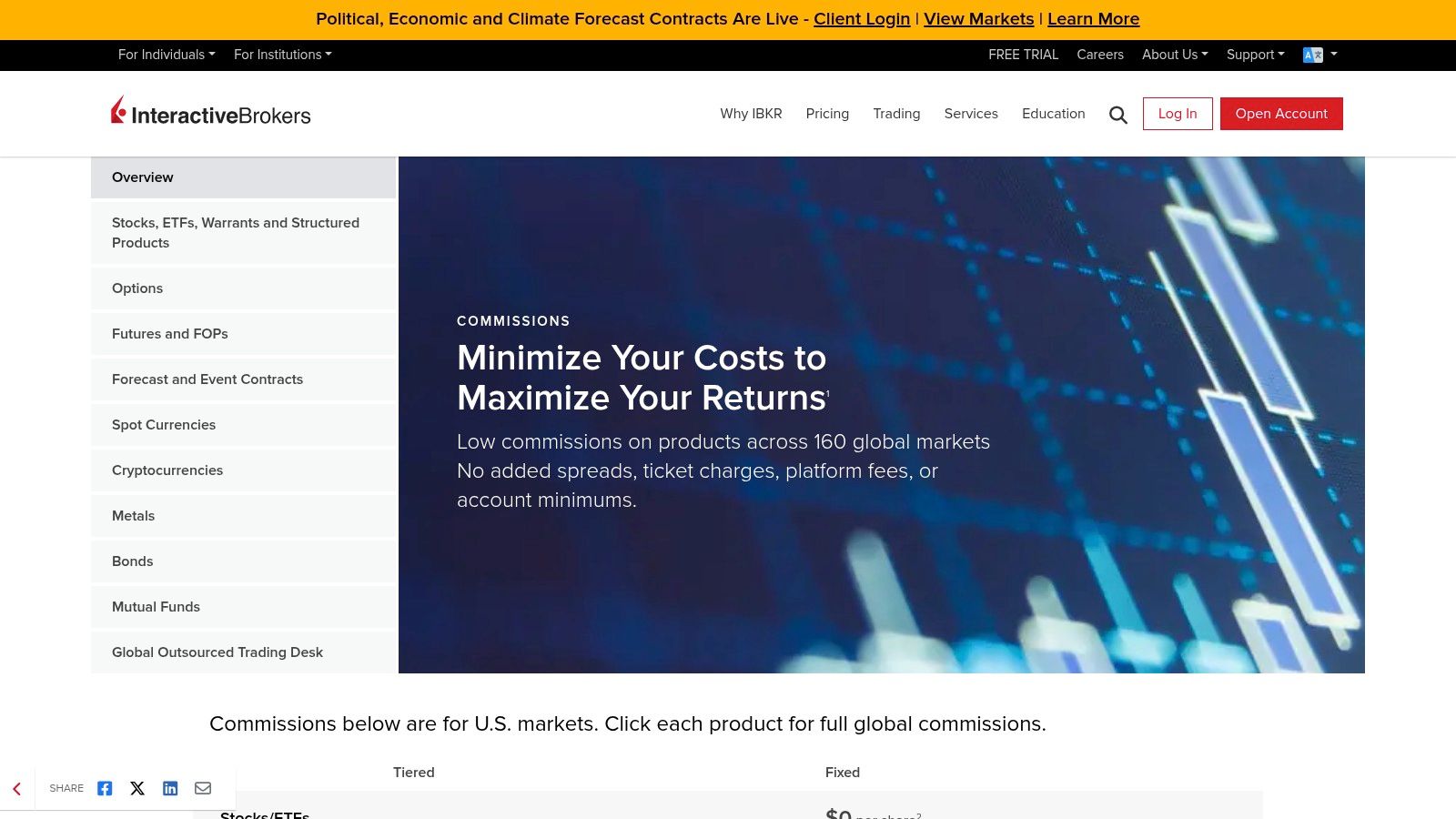
What sets IBKR apart is its scalability. A beginner can start with the user-friendly IBKR GlobalTrader app for simple trades and then graduate to the powerful, but complex, Trader Workstation (TWS) as their skills and needs grow. This pathway ensures you won't outgrow the platform, offering access to an extensive range of assets, including stocks, options, futures, and bonds across more than 150 markets.
Key Features & User Experience
While the IBKR Lite plan is ideal for beginners, the platform's real power lies in its advanced tools and low-cost structure, which become more valuable over time. The ability to trade fractional shares allows new investors to diversify with a small amount of capital. However, the sheer breadth of features and the professional-grade TWS platform can present a significant learning curve compared to more simplified competitors. Customer support is robust, but the platform is built for self-directed investors who are comfortable navigating complex interfaces.
- Pricing: IBKR Lite offers $0 commissions on U.S. stocks and ETFs. IBKR Pro uses a tiered pricing model with very low fees.
- Best For: Ambitious beginners who plan to expand into advanced strategies and global markets.
- Pros: Extremely low trading costs, extensive global market access, and a platform that scales with user expertise.
- Cons: The advanced platforms have a steep learning curve that can be intimidating for true beginners.
Visit the website: https://www.interactivebrokers.com/commissions
10. Vanguard
Vanguard has built its legendary reputation on a philosophy of low-cost, long-term investing, making it one of the best trading platforms for beginners with a "buy-and-hold" mindset. The platform champions passive investment strategies through its world-renowned index funds and ETFs, which feature some of the lowest expense ratios in the industry. For new investors looking to build wealth steadily over time without the complexity of active trading, Vanguard provides a clear and cost-effective path.
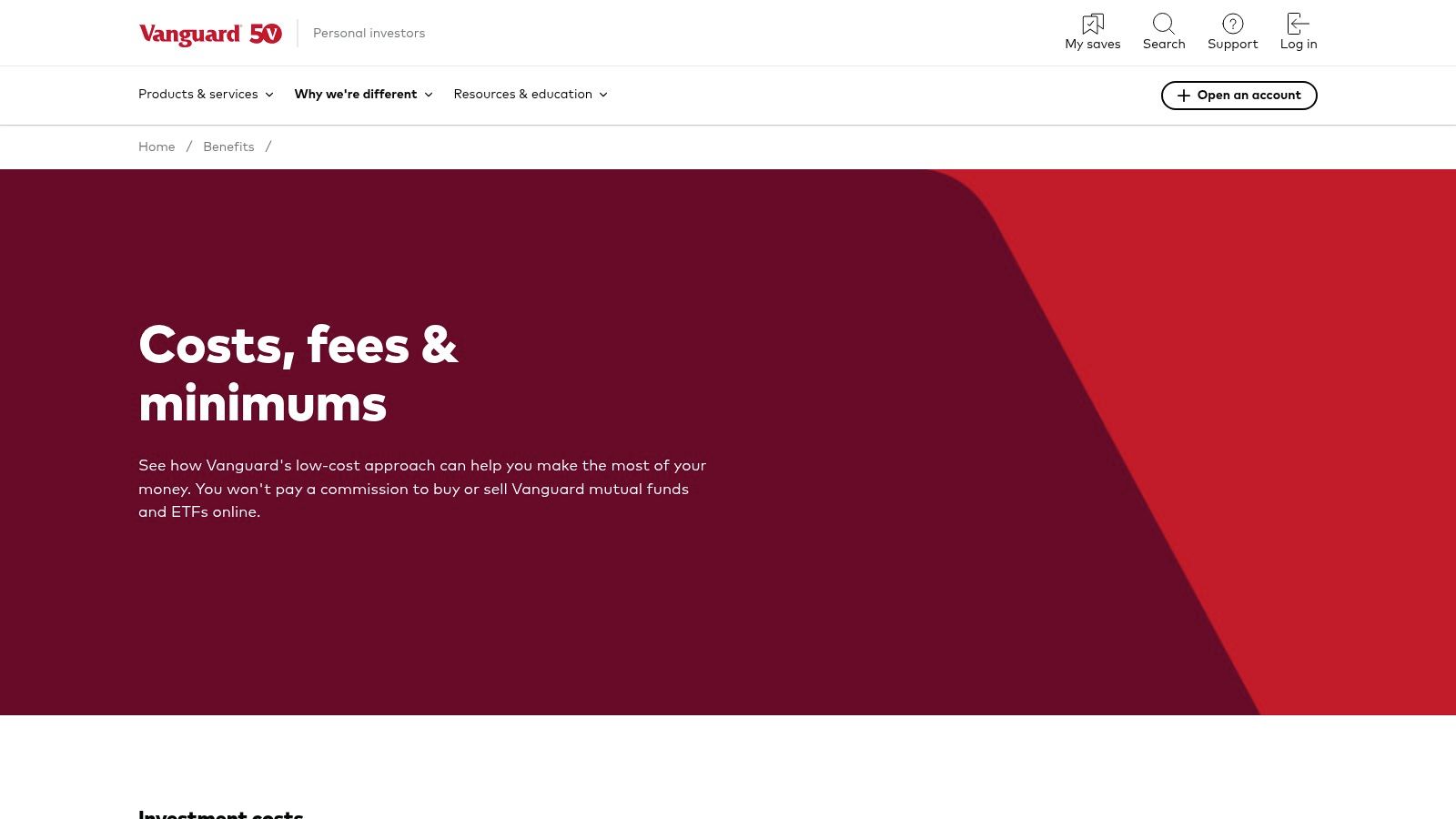
The platform's strength lies in its alignment with long-term financial goals, such as retirement planning. Vanguard's educational resources are geared toward teaching sound investment principles like asset allocation and diversification. This focus helps beginners avoid common pitfalls and learn how to build a lasting, diversified portfolio. The platform is less about flashy tools and more about foundational financial discipline.
Key Features & User Experience
While Vanguard's web and mobile platforms are more straightforward compared to competitors, they are clean, functional, and easy to navigate for core tasks like buying funds and monitoring account growth. The user experience is designed to encourage thoughtful investment decisions rather than frequent trading. Vanguard also offers thousands of no-transaction-fee (NTF) mutual funds from its own family and other companies, providing a wide range of choices for building a diversified portfolio.
- Pricing: $0 commission for online stock and ETF trades. Thousands of NTF mutual funds are available.
- Best For: Beginners focused on long-term, passive investing, especially with mutual funds and ETFs.
- Pros: Industry leader in low-cost funds, excellent for retirement accounts, and strong emphasis on sound investment principles.
- Cons: The trading platform is basic and not designed for active traders; broker-assisted trades incur high fees.
Visit the website: https://investor.vanguard.com/client-benefits/investment-fees
11. Merrill Edge
Merrill Edge, Bank of America's brokerage arm, offers a powerful advantage for beginners already in the BofA ecosystem by seamlessly integrating banking and investing. It provides zero-commission online trades for U.S. stocks and ETFs, making it an affordable entry point. The platform's real strength lies in its combination of robust digital tools and access to in-person guidance at thousands of Bank of America branches, offering a safety net many new investors appreciate.
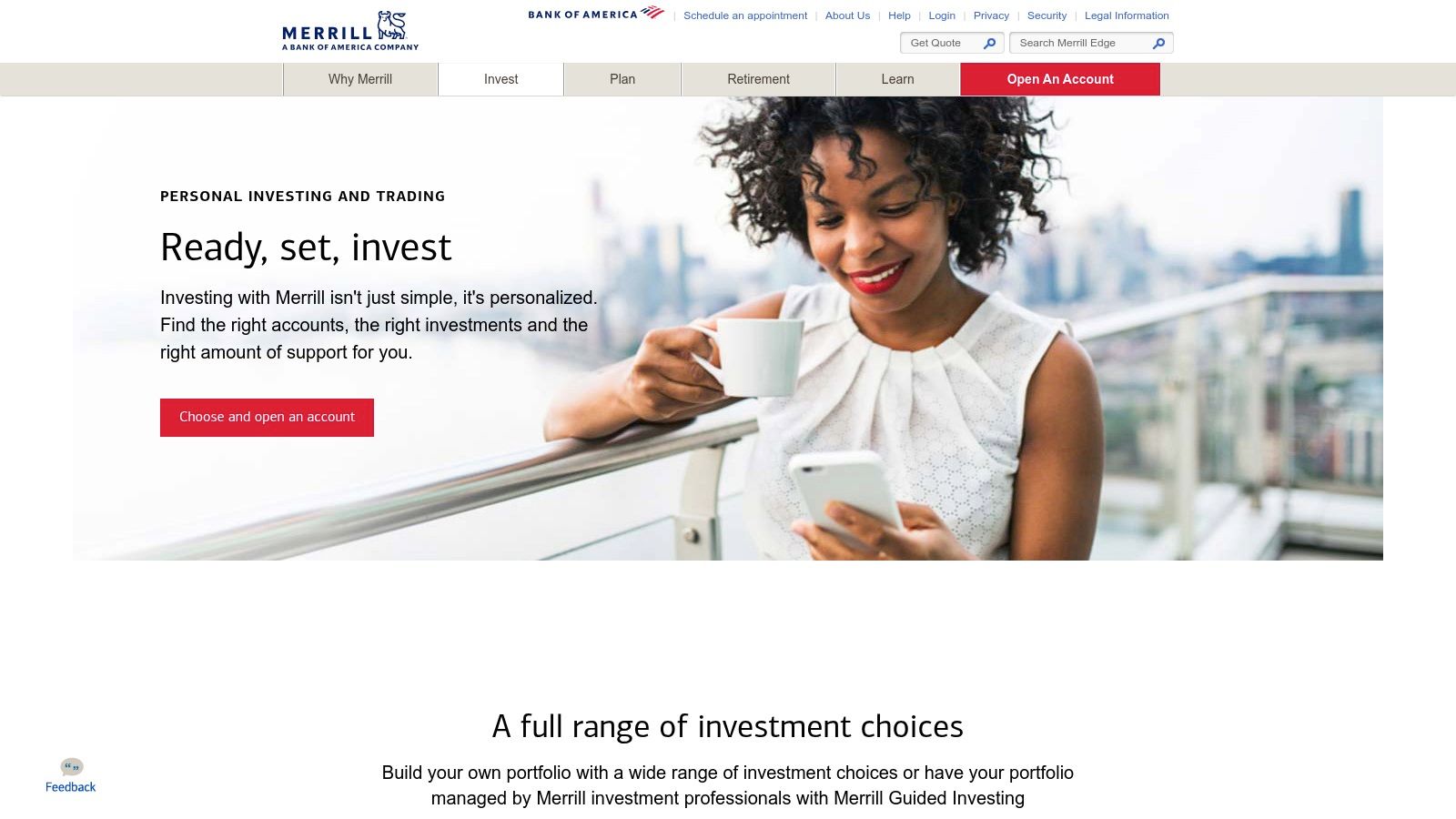
The platform is backed by BofA Global Research, giving users access to high-quality insights and analysis typically reserved for institutional clients. This focus on research and education, combined with the convenience of its banking integration, makes Merrill Edge one of the best trading platforms for beginners who value support and a unified financial view. The Preferred Rewards program also offers significant benefits as your account balance grows.
Key Features & User Experience
Merrill Edge provides a clean user interface on both its web platform and mobile app, making it easy to place trades, monitor investments, and access research. The MarketPro platform offers more advanced charting and tools for those ready to dig deeper. The direct link between your checking and investment accounts simplifies funding and cash management, removing a common point of friction for new investors.
- Pricing: $0 commission for online U.S. stock and ETF trades. Options contracts are $0.65 each.
- Best For: Bank of America customers and beginners who want the option of in-person help alongside a strong digital platform.
- Pros: Seamless integration with BofA banking, access to top-tier research, and in-person support at bank branches.
- Cons: No fractional shares available in self-directed accounts, which can be a drawback for those with limited capital.
Visit the website: https://www.merrilledge.com/investing
12. NerdWallet "Best Brokers for Beginners"
While not a trading platform itself, NerdWallet’s “Best Brokers for Beginners” page is an indispensable resource for anyone starting their investment journey. This continuously updated editorial guide acts as a meta-review, comparing and ranking the top platforms with a sharp focus on the criteria that matter most to newcomers: low costs, strong educational tools, and user-friendly interfaces. It simplifies the overwhelming process of choosing where to invest your money.
What makes this page so valuable is its transparent methodology and clear, concise summaries. NerdWallet’s team does the heavy lifting, analyzing each broker’s fee structure, platform features, and support options. The result is a curated list that allows you to quickly see how different services stack up, complete with direct sign-up links and current promotional offers, making it one of the best first stops for finding a trading platform.
Key Features & User Experience
NerdWallet presents its findings in an easy-to-digest format, typically a ranked list with clear pros and cons for each entry. The user experience is designed for quick comparison, letting you see at a glance which broker excels in specific areas, such as mobile trading or customer support. The content is free to access and regularly updated, ensuring the information reflects the latest market changes and broker offerings as of September 2025.
- Pricing: Free to access all comparison content and reviews.
- Best For: New investors who are still in the research phase and want to compare the best trading platforms for beginners side-by-side.
- Pros: Fast, unbiased side-by-side broker comparisons, clear editorial summaries, and regularly updated information.
- Cons: Includes affiliate links, so users should always confirm fee structures and promotions directly on the broker's site.
Visit the website: https://www.nerdwallet.com/best/investing/online-brokers-for-beginners
Top 12 Beginner Trading Platforms Comparison
| Broker | Core Features & Tools | User Experience ★★★★☆ | Value Proposition 💰 | Target Audience 👥 | Unique Selling Points ✨ |
|---|---|---|---|---|---|
| Fidelity Investments | $0 commissions (stocks/ETFs), fractional shares, strong education | Robust platforms, strong support ★★★★☆ | Broad product lineup, no account mins 💰 | Beginners & intermediate | Extensive learning center 🏆, fractional shares |
| Charles Schwab | $0 commissions, thinkorswim platform, futures trading | Powerful tools but complex for beginners ★★★★☆ | Large branch network, no trade mins 💰 | Beginners to advanced traders | Advanced thinkorswim with paper trading ✨ |
| E*TRADE from Morgan Stanley | $0 stock/ETF trades, robo-advisor, futures, strong mobile app | Clean interface, balanced beginner focus ★★★★☆ | Robo-advisor & wide fund options 💰 | Beginners growing into active | Core Portfolios robo-advisor ✨ |
| Robinhood | $0 trades, fractional shares, Gold membership ($5/mo) | Very simple UI, easy onboarding ★★★☆☆ | Low cost base, Gold perks 💰 | Beginners seeking simplicity | Fractional shares with $1 min, managed portfolios ✨ |
| Webull | $0 commissions, paper trading, strong charts, Premium plan ($3.99/mo) | Good practice tools, evolving features ★★★★☆ | Low-cost premium, practice tools 💰 | Beginners wanting skill growth | Paper trading and affordable Premium tier ✨ |
| Public.com | $0 commissions, options rebates, Premium tier perks | User-friendly app, educational focus ★★★☆☆ | Transparent fees, options rebates 💰 | Beginner retail investors | No payment for order flow, options rebate program ✨ |
| M1 Finance | Automated investing, fractional shares, customizable portfolios | Highly beginner-friendly, automated ★★★☆☆ | $3/mo fee waived above $10k assets 💰 | Long-term passive investors | Customizable 'pies' & auto-rebalancing ✨ |
| SoFi Invest | $0 commissions, robo-advisor (0.25%), integrated financial tools | Clean app, beginner-friendly ★★★☆☆ | $25 inactivity fee, fractional shares 💰 | Beginners & integrated service users | IPO access & financial planner access ✨ |
| Interactive Brokers (IBKR) | $0 commissions Lite, tiered Pro pricing, global markets | Powerful but steep learning curve ★★★☆☆ | Lowest costs, no min account fees 💰 | Beginners to advanced scaling up | Global market access & advanced TWS platform ✨ |
| Vanguard | $0 commissions, low-cost funds, advisory options | Simple platform, long-term focused ★★★★☆ | Industry-low expense ratios 💰 | Passive, buy-and-hold investors | Leader in low-cost index/mutual funds 🏆 |
| Merrill Edge | $0 commissions, MarketPro platform, BofA integration | Good beginner support, branch access ★★★☆☆ | No fractional shares on self-directed 💰 | Beginners wanting bank integration | Bank of America Preferred Rewards integration ✨ |
| NerdWallet "Best Brokers" | Updated beginner broker list, transparent ratings | Clear, balanced editorial ★★★★☆ | Free access to comparison content 💰 | Beginner investors | Regularly updated & direct sign-up links ✨ |
Your Next Step: Taking Action with Confidence
Navigating the landscape of the best trading platforms for beginners can feel like the first major hurdle in your investment journey. We've explored a wide spectrum of options, from established giants like Fidelity and Charles Schwab, renowned for their comprehensive educational resources and robust research tools, to modern, mobile-first platforms like Robinhood and Webull that prioritize user experience and accessibility. Each platform offers a unique blend of features, fee structures, and philosophies designed to cater to different types of new investors.
Your primary takeaway should be this: there is no single "best" platform for everyone. The ideal choice is deeply personal and hinges on your individual goals, learning preferences, and investment style. A long-term, passive investor might find a perfect home with a low-cost, automated platform like M1 Finance or Vanguard, while an aspiring active trader may gravitate towards the advanced charting and data offered by Interactive Brokers or E*TRADE.
How to Choose Your Starting Platform
To move from analysis to action, distill your needs down to a few core priorities. Ask yourself these critical questions:
- What is my primary goal? Are you building a long-term retirement portfolio, engaging in swing trading, or simply learning the ropes with a small amount of capital? Your answer will point you toward platforms that excel in that specific area. For example, Public.com's social features are great for learning, while SoFi Invest offers an integrated financial ecosystem.
- How important is education? If you are starting from scratch, the value of high-quality educational content, webinars, and research tools cannot be overstated. Platforms like Fidelity, Schwab, and Merrill Edge invest heavily in these resources, providing a structured learning environment that can significantly shorten your learning curve.
- What is my tolerance for complexity? Be honest about how much time you are willing to invest in learning a new interface. While IBKR offers unparalleled institutional-grade tools, its complexity can be a significant barrier for a true beginner. Conversely, a platform like Robinhood makes placing your first trade incredibly simple, though it may lack the deeper analytical tools you'll desire later.
- What assets do I want to trade? Ensure the platform supports the securities you are interested in. While most offer stocks and ETFs, access to options, mutual funds, bonds, or specific cryptocurrencies can vary significantly.
A Framework for Getting Started
Once you've narrowed your choices, don't succumb to analysis paralysis. The most crucial step is to begin. Many of the platforms we reviewed, including Webull and Robinhood, offer paper trading or virtual accounts. These are invaluable, risk-free tools that allow you to test-drive the platform's interface and practice your trading strategy with simulated money.
We also discussed how understanding market sentiment is a powerful complement to fundamental and technical analysis. Integrating this third dimension can help you avoid making emotionally driven decisions, such as panic-selling during a market downturn or buying into a stock at the peak of its hype. This is where external tools become essential.
Choosing one of the best trading platforms for beginners is your foundational step, but it is just the beginning. Your growth as an investor will come from a commitment to continuous learning, disciplined strategy, and the intelligent use of tools that provide a clearer picture of the market. Start small, stay curious, and leverage the wealth of resources at your disposal. The path to financial empowerment is a marathon, not a sprint, and you have just taken the most important step by getting on the starting line.
Ready to add a crucial layer of insight to your trading strategy? The Fear Greed Tracker provides real-time market sentiment data, helping you understand the emotional drivers behind market movements on any platform you choose. Make more rational, data-backed decisions by visiting the Fear Greed Tracker and start trading with greater confidence today.
